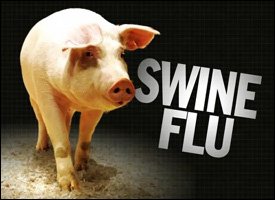
Swine Flu Outbreak In St. Kitts – Nevis
Basseterre, St. Kitts – Nevis
July 27, 2009 (SKNIS)
Health authorities have advised residents of St. Kitts and Nevis not to panic in the wake of the first recorded death from the H1N1 Virus (commonly referred to as Swine Flu).
A 28 year old woman, with no recent history of travel, was announced as the first local person to die from the virus. Speaking at a press conference on Monday, July 27, 2009, Chief Medical Officer (CMO), Dr. Patrick Martin said the Ministry of Health had also received confirmation of a third local case of H1N1 from the Caribbean Epidemiology Center (CAREC). The 21 year old female resident did not require medication and hospitalization.
“There is no need for alarm or panic,” said Dr. Martin. “The vast majority of persons experience mild illness and recover quickly without medication.”
Consistent with international health regulations, the Ministry of Health on Saturday, July 25, informed the World Health Organization (WHO) of this new development.
The CMO expressed that the response of the Federation’s health system remains the same. The primary goals are still early detection of cases in the resident community, the prevention of virus transmission through personal hygiene measures, timely and effective interventions of persons who are affected, and information sharing.
While most occurrences of H1N1 are mild, there is still the possibility of severe illness for persons with certain high risk conditions, meaning: groups of persons whose immune systems may not be as robust as normal because of underlying conditions.
In his address Dr. Martin stressed that the key health advice is unchanged:
· Any person who experience flu-like illness should stay at home and contact their personal physician for advice.
· Any person with flu-like illness, plus complications, meaning breathing difficulty, weakness or dehydration must seek medical attention at the nearest hospital. In such case, a family member of friend should call ahead to alert the hospital staff of your imminent arrival.
· Cover your cough and sneeze, and wash your hands with soap and water.
Even though an H1N1 vaccine is expected in 4 ““ 6 months, the individual and the family are still expected to institute protective measures. Antiviral medication is available to be prescribed to persons who are deemed to be in need by a doctor.
